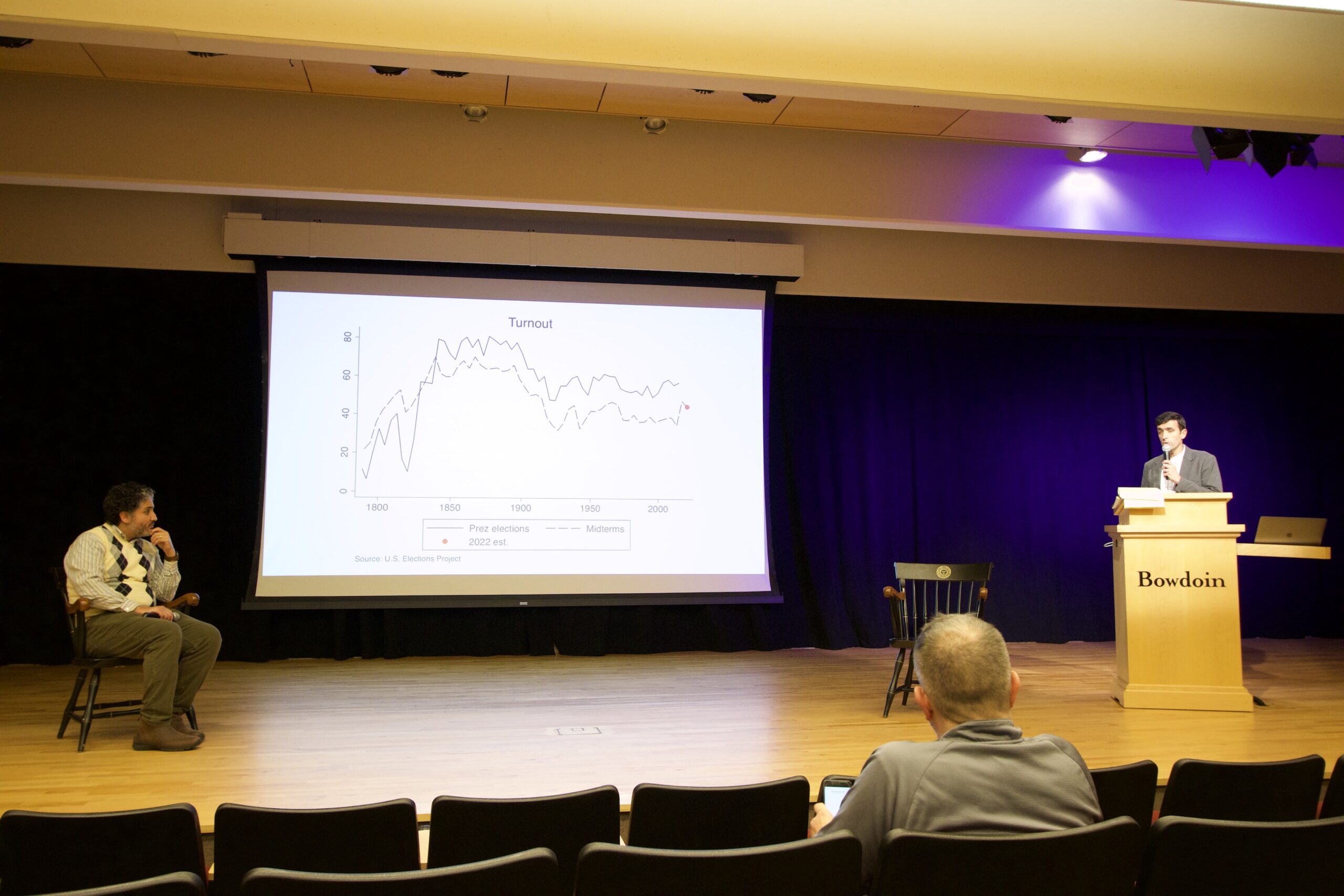Government department demystifies midterm elections
November 18, 2022
 Andrew Yuan
Andrew YuanOn Tuesday night, the Department of Government and Legal Studies hosted a public debrief in Kresge Auditorium on last week’s midterm elections. The event, presented by Professor of Government Michael Franz and Assistant Professor of Government Ángel Saavedra Cisneros, was a data-driven overview of election participation and outcomes as well as future implications for potential state and federal policy.
The Democratic Party maintained control of the Senate by a narrow margin, managing to flip one seat while holding onto seats in key battleground states. In the House, the Republican Party prevailed, gaining enough ground to eke out a 218 seat majority. Despite their loss of seats, the Democrats put up a much better fight than statistically expected, Franz asserted. Franz also shared data demonstrating that Democrats have historically performed much worse under similar political and economic circumstances.
“The Democrats did a lot better in the House than we would have expected them to do, given the history of midterm elections,” Franz said. “So Democrats had, by and large, a pretty good night.”
After breaking down the election’s results, Franz discussed voter participation metrics. Forty-seven percent of eligible voters cast their ballots this year—a slight dip from 49.4 percent in 2018. Franz lamented a less-than-ideal turnout but expressed satisfaction that the increase in voter activity during the Trump era has not worn off.
“The midterm elections of 2022 are a little off the pace of where they were in 2018, which was a 100-year high [for midterms],” Franz said. “Perhaps you think we would go back down to the kind of equilibrium turnout rate in the last number of decades, which was about 40 percent.… But, we could also still interpret these numbers as pretty bad nonetheless, as more than half of the eligible voters in the country did not turn out to vote last week.”
After Franz, Saavedra Cisneros took the stage to dive deeper into Americans’ ideological leanings based on exit poll data. Saavedra Cisneros stressed that, while an imperfect indicator of voters’ logic at the polls, this data is an important tool when evaluating election outcomes and anticipating the future.
In terms of what brought voters to the polls this year, exit poll data collected by Saavedra Cisneros’ students revealed a deeply partisan set of concerns that center on issues of national, rather than local, importance.
“We basically have this trend that Democrats care about abortion [and] gun policy. Republicans tend to care more about immigration, inflation and crime,” Saavedra Cisneros said. “I made a joke with one of my colleagues today that all politics is now national.”
Another piece of exit poll data Saavedra Cisneros focused on was that two thirds of polled Americans support permanent legal status path to citizenship for undocumented immigrants, a figure which suggests imminent watershed change in the realm of immigrants’ rights.
“This gives me hope—not too much hope—that in this coming decade, we might see some change, because this is something that is supported by most groups in our country,” Saavedra Cisneros said.
Following the presentation, Franz and Saavedra Cisneros fielded questions from members of the audience on their findings and the future of U.S. policy. When asked about how a split Congress will impact progress in key, contentious policy areas, both Franz and Saavedra Cisneros expressed cynicism about the future.
“If you look at the makeup of Congress, there is a lot to suggest that not much is going to happen,” Franz said. “Things will just kind of stall, and the President will be forced to do more on the executive side, like Barack Obama tried in his second term. That’s not great news, but that would be my initial kind of prediction.”

Comments
Before submitting a comment, please review our comment policy. Some key points from the policy: